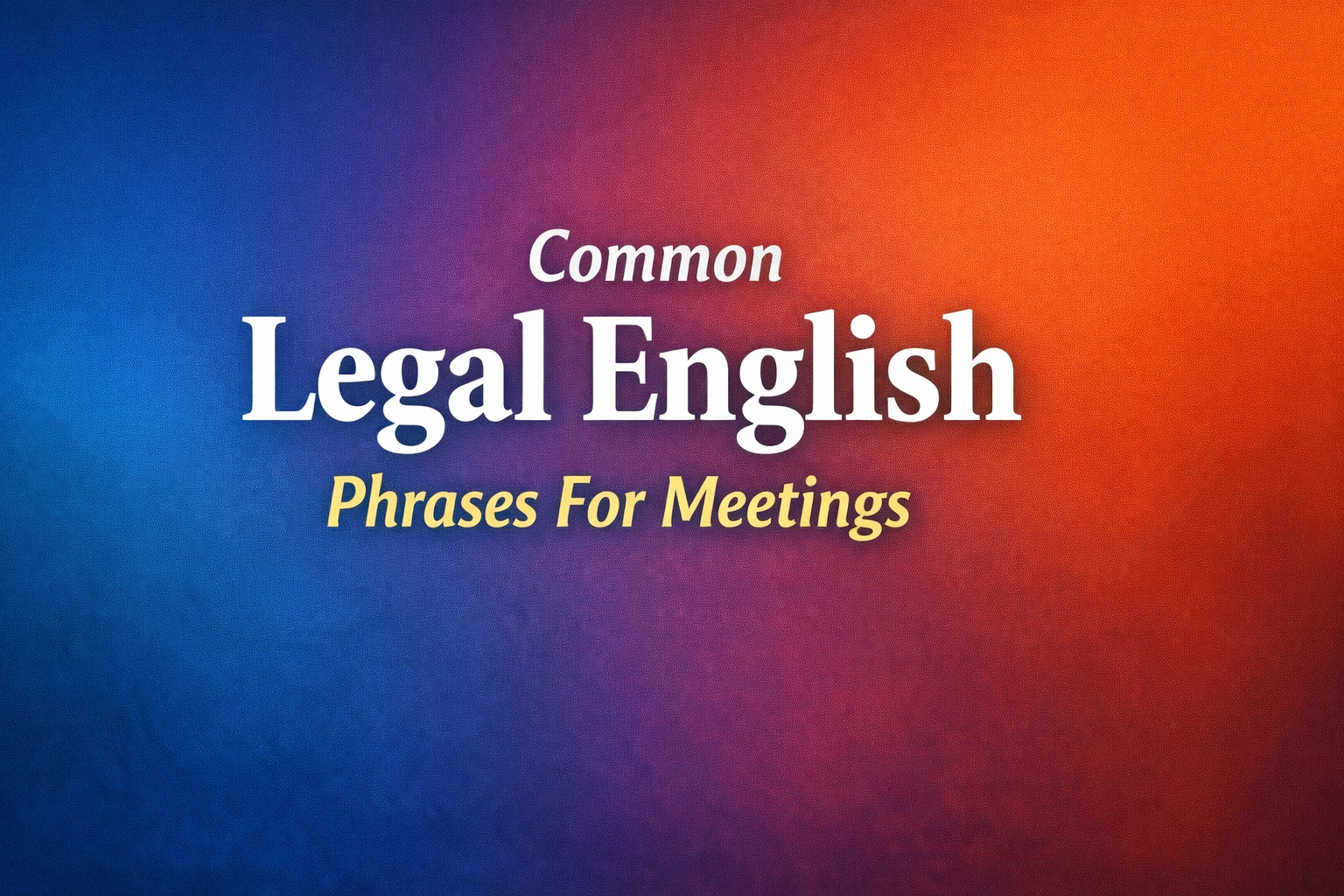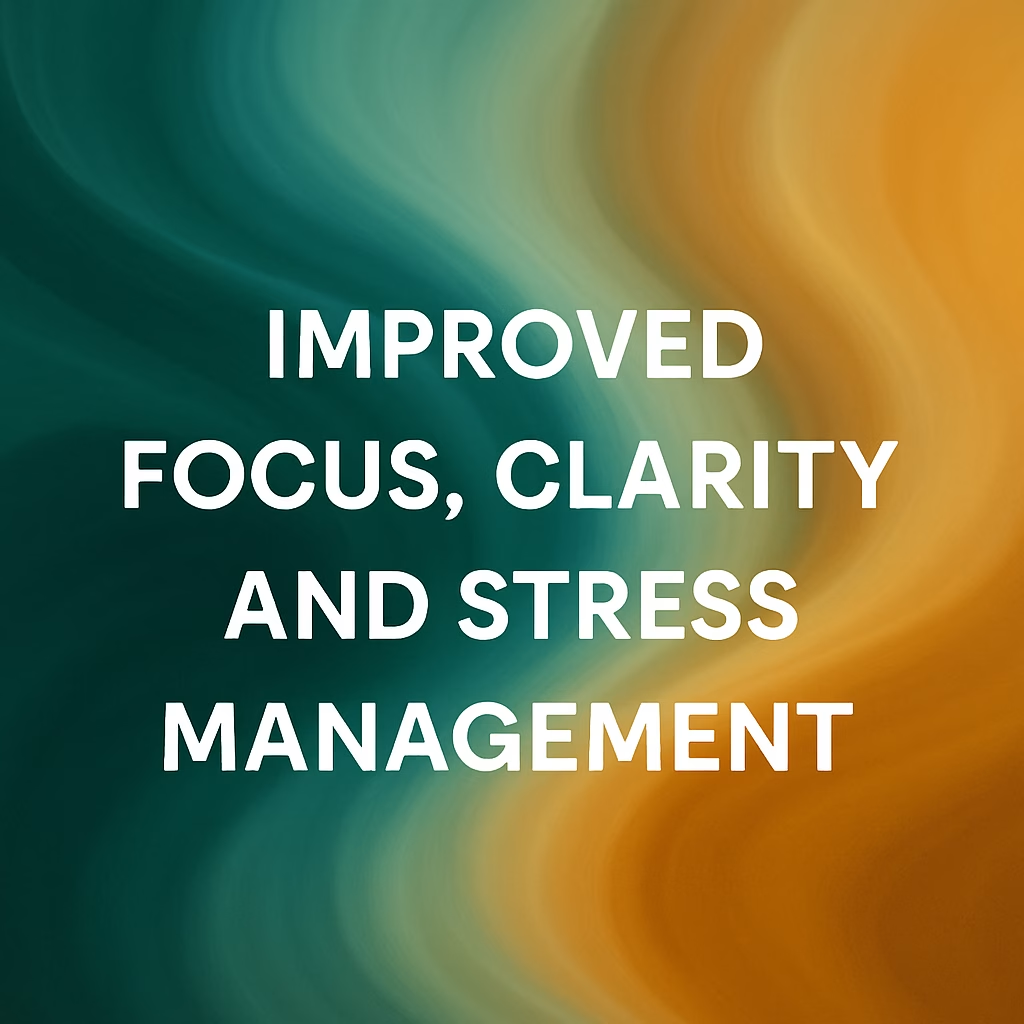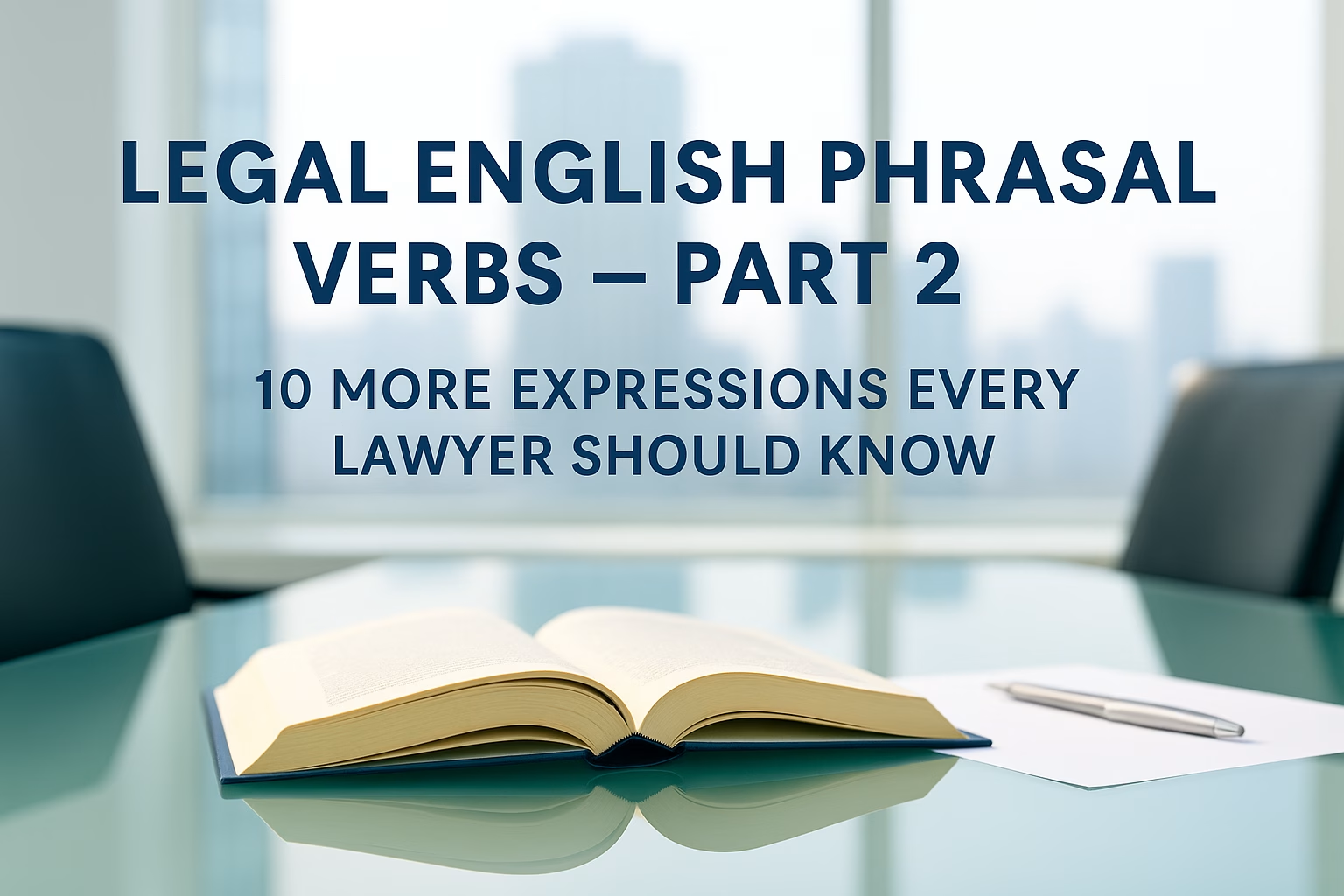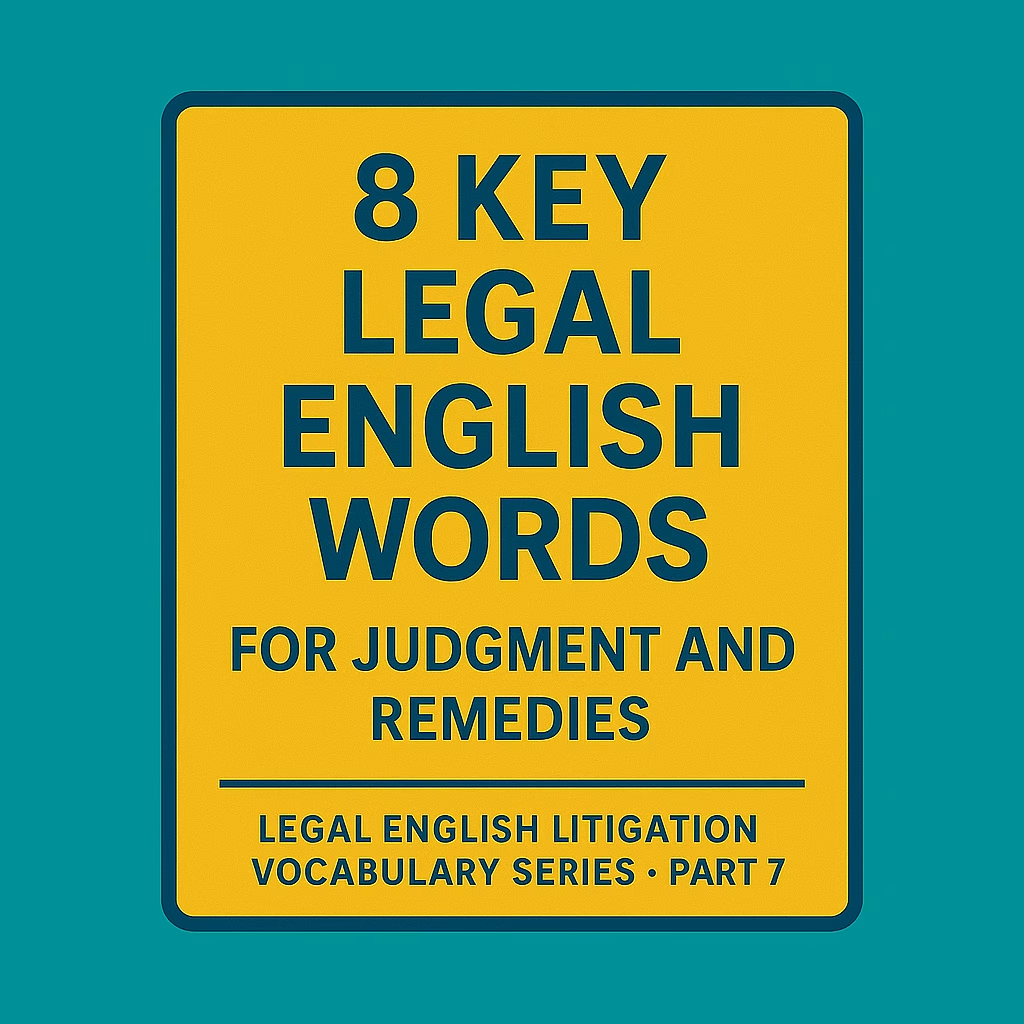
Ready to Go Deeper?
At LegalEnglish4Lawyers.com, we don’t just define legal terms — we explore them through real documents, client scenarios, and clause-by-clause analysis.
Click here to see a quick view of all posts.
-
Common Legal English Phrases For Meetings
Introduction
Legal meetings are often fast-paced, informal in tone, and full of expressions that never appear in contracts or case law. For non-native English-speaking lawyers, these moments can be more challenging than drafting or research. The difficulty is not legal knowledge, but understanding the spoken Legal and Business English that lawyers use in meetings, calls, and internal discussions.
This post highlights common Legal English phrases regularly used in meetings that non-native lawyers often misunderstand. These expressions are drawn from real conversations in law firms and in-house legal departments.
Legal English Phrases Commonly Used in Meetings
1. “Let’s take this offline”
This does not mean leaving the internet. It means continuing the discussion later, usually privately or outside the meeting.
Example:
“Let’s take this offline and discuss it after the call.”2. “We need alignment”
This does not refer to physical positioning. It means agreement or shared understanding among stakeholders.
Example:
“We need alignment between legal and the business before proceeding.”3. “Can you flag that issue?”
This does not involve a literal flag. It means drawing attention to a problem or risk.
Example:
“Please flag any compliance issues during your review.”4. “Let’s circle back”
This means returning to a topic later, not immediately.
Example:
“Let’s circle back to this once we have more information.”5. “We should table this”
In American English, this means postponing discussion. In British English, it can mean introducing a topic. Context matters.
Example:
“Let’s table this issue until the next meeting.”6. “That’s above my pay grade”
This does not refer to salary. It means the decision must be made by someone more senior.
Example:
“That question is above my pay grade. We need executive input.”7. “We need buy-in”
This does not involve purchasing. It means obtaining approval or support from key stakeholders.
Example:
“We need buy-in from senior management before moving forward.”8. “Let’s set that aside for now”
This means temporarily pausing discussion of an issue without rejecting it.
Example:
“Let’s set that aside for now and return to it after the review.”9. “What’s the ask?”
This refers to the specific request or action being sought.
Example:
“Before we proceed, what’s the ask from legal?”10. “We’re not there yet”
This means the issue is premature or not ready for decision.
Example:
“We’re not there yet on approving the settlement.”11. “This is a moving target”
This means the facts, requirements, or expectations keep changing.
Example:
“The regulatory guidance is a moving target right now.”12. “Let’s make sure we’re on the same page”
This means confirming that everyone has the same understanding.
Example:
“Let’s make sure we’re on the same page about the timeline.”13. “That’s helpful context”
This usually means the information helps frame the discussion, not that it changes the outcome.
Example:
“That’s helpful context for assessing liability.”14. “Can you walk us through this?”
This means explaining something step by step.
Example:
“Can you walk us through the proposed structure?”15. “From a legal perspective”
This signals that the speaker is separating legal risk from business considerations.
Example:
“From a legal perspective, this creates potential exposure.”16. “That raises a concern”
A polite way to signal risk without sounding confrontational.
Example:
“That raises a concern regarding data protection.”17. “We may need to escalate this”
This means involving more senior management or decision makers.
Example:
“We may need to escalate this to the general counsel.”18. “Can we narrow the scope?”
This means reducing the size or complexity of a request.
Example:
“Can we narrow the scope to focus only on the U.S. operations?”19. “Let’s confirm next steps”
This signals the end of discussion and focuses on action items.
Example:
“Before we close, let’s confirm next steps.”20. “We’ll need to think this through”
This does not mean refusal. It means further analysis is required.
Example:
“We’ll need to think this through before committing.”Why These Phrases Matter
Misunderstanding meeting language can lead to missed expectations, silence at critical moments, misaligned follow-up actions, or reduced professional credibility. For lawyers, meetings are where risk is framed, decisions are influenced, and trust is built. Understanding how these expressions function in real time helps ensure your legal expertise is clearly understood and properly valued.
Conclusion
Legal meetings rely heavily on informal but precise language. These phrases are rarely taught in textbooks, yet they appear daily in professional practice. For non-native English-speaking lawyers, learning how these expressions work in context is essential for effective participation, confidence, and influence in meetings.
Improve Your Spoken Legal English
At LegalEnglish4Lawyers.com, we work with lawyers, in-house counsel, and law students who want to strengthen their spoken Legal or Business English for real professional situations, including meetings, calls, interviews, or classroom discussions.
Lessons are taught by an experienced lawyer and Legal English teacher and focus on helping you:
- Understand and use spoken Legal English in meetings or internal discussions
- Navigate Business English commonly used in law firms or corporate environments
- Build confidence for client interactions, interviews, presentations, or law school participation
Whether you are already practicing law or preparing to enter the profession, targeted language training can help you communicate more clearly and confidently.
Ready to start? Book your personalized lesson at LegalEnglish4Lawyers.com.
Disclaimer
The content provided herein is for discussion and educational purposes only and may contain errors. The reader is responsible for confirming the accuracy of the information. This content does not constitute legal, professional, or language training advice. We disclaim any liability for any loss or damage incurred directly or indirectly from reliance on this material.
Other Legal English Posts
Legal English VocabularyCommon Legal English Phrases For Meetings
Introduction Legal meetings are often fast-paced, informal in tone, and full of expressions that nev…
Focus & ProductivityHow Lawyers Can Use Breathwork To Reduce Stress and Improve Clarity and Focus
Introduction: Breathwork Affects Clarity, Focus and Stress. Controlled breathwork from the yogic tra…
Legal English Vocabulary25 Essential Contract Drafting Verbs Every Lawyer Should Know
Introduction: Contract drafting relies heavily on precise verbs, and choosing the right one can affe…
Legal English VocabularyLegal English for Lawyers: 20 Real Phrases Lawyers Use to Talk About Their Cases
Introduction: This list of legal English phrases may seem somewhat random — and that’s because it is…
Artificial Intelligence Key WordsHow CEOs Are Talking About AI in the Workplace: 21 Key Terms Lawyers Should Know
Introduction: Artificial intelligence (AI) is transforming not only how businesses operate but also …
Everyday English for Lawyers27 Useful English Expressions for Lawyers in the Workplace
Strengthen Your Communication Inside and Outside the Office with 27 Useful English Expressions for L…
ProductivityReduce Stress After Work With the Powerful Technique of One-Pointedness (Ekāgratā)
Reduce stress, restore calm, and gain clarity after a busy day with one-pointedness (ekāgratā) as de…
Legal English (General)Mastering Legal English: 8 Strategies for Non-Native English-Speaking Lawyers and Law Students
Introduction. For lawyers and law students who speak English as a second language, developing fluenc…
Phrasal VerbsLegal English Phrasal Verbs – Part 2: 10 More Key Expressions Every Lawyer Must Know
Introduction. Legal professionals use phrasal verbs every day—often without even realizing it. Wheth…
8 Part Litigation SeriesAppeals and Enforcement – 8 Key Legal English Vocabulary Words – Litigation Vocabulary Series – Part 8
Introduction To Legal English for Appeals and Enforcement. The litigation process doesn’t always end…
8 Part Litigation SeriesJudgment and Remedies: 8 Key Legal English Words – Legal English Litigation Vocabulary Series – Part 7
Introduction To Judgment & Remedies. When a trial concludes, the court enters its decision—and t…
8 Part Litigation SeriesThe Trial Stage Legal English Vocabulary – 8 Essential Litigation Vocabulary Terms- Part 6
Introduction To The Trial Stage. The trial is the culmination of months—or years—of litigation strat…
8 Part Litigation SeriesPre-Trial Motions and Summary Judgment-Essential Litigation Vocabulary-Part 5
Introduction To Pre-Trial Motions and Summary Judgment. As litigation approaches trial, pre-trial mo…
8 Part Litigation SeriesDiscovery Phase-Essential Litigation Vocabulary-Part 4
Introduction To The Discovery Phase. The discovery phase is often the longest and most complex part …
8 Part Litigation SeriesDefenses & Responsive Pleadings-Essential Litigation Vocabulary-Part 3
Introduction: Defenses & Responsive Pleadings After a lawsuit is filed, the defendant’s response…
8 Part Litigation SeriesFiling a Lawsuit-Essential Litigation Vocabulary-Part 2
Introduction Filing a lawsuit formally initiates a legal dispute and sets in motion the procedural a…
8 Part Litigation SeriesPre-Litigation Stage-Essential Litigation Vocabulary-Part 1
Introduction Litigation doesn’t begin in the courtroom—it often starts long before a complaint is fi…
Legal English (General)10 Legal English Terms Every International Lawyer Should Know
Whether you’re drafting a contract, negotiating a deal, or advising clients across borders, here are…
Mergers & Acquisitions (M&A)17 Key Vocabulary Words for Mergers and Acquisitions
In this post, we’ll break down 17 key vocabulary words for mergers and acquisitions (M&A). These…
Trademarks12 Useful Trademark Vocabulary Words:
Understanding 12 Key Trademarks Terms. Trademarks play a crucial role in protecting brands and maint…
Phrasal VerbsLegal English Phrasal Verbs:
20 Essential Expressions for Lawyers. Phrasal verbs are a key part of English communication, and law…
StartupsVenture Capital Start Up Glossary: 22 Key Terms Every Startup Should Know
Navigating the world of venture capital (VC) can feel like learning a new language. Whether you are …
Artificial Intelligence Key WordsArtificial Intelligence Glossary (Part 3): 7 key vocabulary words and phrases to understand the new language around AI.
(Confabulation) – (AI Red-Teaming) – (Provenance Data Tracking) – (Cascading Impac…
Artificial Intelligence Key WordsArtificial Intelligence Glossary (Part 2): 9 key vocabulary words and phrases to understand the new language of AI.
(Dan “Do Anything Now”) – (Jailbreak) – (Safety Guardrail) – (AI-Boyfr…
Artificial Intelligence Key WordsArtificial Intelligence Key Words (Part 1): 13 key vocabulary words and phrases to understand the new language of AI.
(Throttle the Creation) – (Regurgitate Training Data) – (Open Source AI) – (Biden&…
TrademarksUS Supreme Court Limits Foreign Application of US Trademark Law
The Supreme Court, applying the presumption against extraterritoriality, clarified that the Lanham A…
-
How Lawyers Can Use Breathwork To Reduce Stress and Improve Clarity and Focus
Introduction: Breathwork Affects Clarity, Focus and Stress.
Controlled breathwork from the yogic tradition, known as प्राणायाम (prāṇāyāma), is emerging as a powerful non pharmacological tool for professionals seeking enhanced clarity, sustained focus, and improved stress management. This post explores the potential cognitive and physiological benefits associated with regulated breathing and outlines how the concept of प्राणायाम (prāṇāyāma) is established in the classical yoga texts. This post does not explain how to perform any techniques. Anyone interested in breathwork should learn from a qualified instructor.
Etymology: What प्राणायाम (prāṇāyāma) Means
The word प्राणायाम (prāṇāyāma) is traditionally broken into two components:
- प्राण (prāṇa): life force or vital energy. In the yogic view, prāṇa is the subtler energy that connects the physical body with the mind. It comes from the verbal root अन् (an), meaning “to breathe”.
- आयाम (āyāma): extension, regulation, or expansion.
Together, प्राण + आयाम yields प्राणायाम (prāṇāyāma), meaning the regulation, expansion, or intentional guidance of the breath and vital energy. This interpretation appears throughout traditional yoga commentaries and is referenced in the Yoga Sutra of Patañjali, where प्राणायाम (prāṇāyāma) is described as a bridge between physical steadiness आसन (āsana) and concentration धारणा (dhāraṇā).
Potential Benefits of Breathwork
Research on breath regulation continues to develop and results vary among individuals. However, early studies and widely discussed findings in academic and wellness literature suggest several potential benefits. These are not guaranteed outcomes but areas of interest frequently explored in scientific and therapeutic discussions.
Sharpened Focus and Cognitive Control
Breath regulation may activate the prefrontal cortex, which is associated with decision making, attention, and executive function. These cognitive domains are essential for legal analysis, negotiation, and strategy.
Enhanced Stress Resilience and Management
Slow and controlled breathing can influence the body’s stress response and may support a sense of calm during demanding situations such as hearings, client meetings, or complex drafting tasks.
Cultivating Emotional Balance and Composure
Some studies suggest that intentional breathing can help individuals stay composed when facing conflict, adversarial interactions, or high pressure deadlines. This may support a more balanced tone in communication.
Countering Mental Fatigue
Breath awareness practices may counter patterns of shallow breathing that contribute to mental exhaustion, which is relevant for professionals working long hours.
Supporting Rest and Sleep Quality
Some breath regulation practices may help quiet mental activity before bedtime. Individual results vary.
Releasing Muscular Tension and Improving Physical Ease
Breathwork may help reduce muscular tension in areas that commonly tighten during prolonged work such as the jaw, neck, and upper back.
प्राणायाम (prāṇāyāma) in the Yogic Tradition and Its Influence on the Mind
प्राणायाम (prāṇāyāma) is described in several key sutras in the Yoga Sutra of Patañjali, specifically in साधनपादः (Sādhana Pāda), Chapter Two, which focuses on practice and discipline.
Sādhana Pāda, Sutra II.49
तस्मिन् सति श्वासप्रश्वासयोर्गतिविच्छेदः प्राणायामः
tasmin sati śvāsa praśvāsa yoḥ gati vicchedaḥ prāṇāyāmaḥOnce steadiness in आसन (āsana) is established, प्राणायाम (prāṇāyāma) is the regulation or suspension of inhalation and exhalation. This describes प्राणायाम (prāṇāyāma) as intentional breath regulation that shifts attention inward.
Sādhana Pāda, Sutra II.50
बाह्याभ्यन्तरस्थम्भवृत्तिर्देशकालसंख्यानिभिः परिदृष्टो दीर्घसूक्ष्मः
bāhya abhyantara stambha vṛttiḥ deśa kāla saṅkhyānibhiḥ paridṛṣṭo dīrgha sūkṣmaḥKey Sanskrit Terms:
- देश (deśa): location
- काल (kāla): time or duration
- संख्या (saṅkhyā): count
प्राणायाम (prāṇāyāma) involves refining the breath so that it becomes long and subtle, extended in देश (deśa) space or location, काल (kāla) time, and संख्या (saṅkhyā) number. Here the text highlights qualities of refinement and steadiness rather than force.
Sādhana Pāda, Sutra II.53
धारणासु च योग्यता मनसः
dhāraṇāsu ca yogyatā manasaḥThrough प्राणायाम (prāṇāyāma), the mind becomes fit for concentration धारणा (dhāraṇā).
Grammar Note: योग्यता (yogyatā)
This feminine noun comes from the root युज् (yuj), meaning “to join”, combined with the तल् प्रत्यय (tal pratyaya), which forms abstract feminine nouns meaning “the state of being X”. Thus योग्यता (yogyatā) means “the state of being fit or ready”, indicating that प्राणायाम (prāṇāyāma) creates readiness for concentration rather than forcing it.This link between breath and clarity is one reason प्राणायाम (prāṇāyāma) is widely associated with improved focus, emotional balance, and steadiness under pressure, qualities relevant to the legal profession.
Conclusion
Although practice results vary widely among individuals, many people explore प्राणायाम (prāṇāyāma) for potential support in mental clarity, emotional steadiness, and stress regulation. Its foundational role in the Yoga Sutra of Patañjali highlights its purpose as a bridge between the body and the mind. Anyone interested in breathwork should learn these practices directly from a qualified instructor.
Medical Disclaimer
The information provided here is for educational and informational purposes only. It does not constitute medical advice, diagnosis, or treatment. Breathwork practices may not be appropriate for everyone. Always consult a qualified healthcare professional before beginning any new wellness, breathing, or mental health related practice.
More Posts to Improve Legal English
Legal English VocabularyCommon Legal English Phrases For Meetings
Introduction Legal meetings are often fast-paced, informal in tone, and full of expressions that nev…
Focus & ProductivityHow Lawyers Can Use Breathwork To Reduce Stress and Improve Clarity and Focus
Introduction: Breathwork Affects Clarity, Focus and Stress. Controlled breathwork from the yogic tra…
Legal English Vocabulary25 Essential Contract Drafting Verbs Every Lawyer Should Know
Introduction: Contract drafting relies heavily on precise verbs, and choosing the right one can affe…
Legal English VocabularyLegal English for Lawyers: 20 Real Phrases Lawyers Use to Talk About Their Cases
Introduction: This list of legal English phrases may seem somewhat random — and that’s because it is…
Artificial Intelligence Key WordsHow CEOs Are Talking About AI in the Workplace: 21 Key Terms Lawyers Should Know
Introduction: Artificial intelligence (AI) is transforming not only how businesses operate but also …
Everyday English for Lawyers27 Useful English Expressions for Lawyers in the Workplace
Strengthen Your Communication Inside and Outside the Office with 27 Useful English Expressions for L…
ProductivityReduce Stress After Work With the Powerful Technique of One-Pointedness (Ekāgratā)
Reduce stress, restore calm, and gain clarity after a busy day with one-pointedness (ekāgratā) as de…
Legal English (General)Mastering Legal English: 8 Strategies for Non-Native English-Speaking Lawyers and Law Students
Introduction. For lawyers and law students who speak English as a second language, developing fluenc…
Phrasal VerbsLegal English Phrasal Verbs – Part 2: 10 More Key Expressions Every Lawyer Must Know
Introduction. Legal professionals use phrasal verbs every day—often without even realizing it. Wheth…
8 Part Litigation SeriesAppeals and Enforcement – 8 Key Legal English Vocabulary Words – Litigation Vocabulary Series – Part 8
Introduction To Legal English for Appeals and Enforcement. The litigation process doesn’t always end…
8 Part Litigation SeriesJudgment and Remedies: 8 Key Legal English Words – Legal English Litigation Vocabulary Series – Part 7
Introduction To Judgment & Remedies. When a trial concludes, the court enters its decision—and t…
8 Part Litigation SeriesThe Trial Stage Legal English Vocabulary – 8 Essential Litigation Vocabulary Terms- Part 6
Introduction To The Trial Stage. The trial is the culmination of months—or years—of litigation strat…
8 Part Litigation SeriesPre-Trial Motions and Summary Judgment-Essential Litigation Vocabulary-Part 5
Introduction To Pre-Trial Motions and Summary Judgment. As litigation approaches trial, pre-trial mo…
8 Part Litigation SeriesDiscovery Phase-Essential Litigation Vocabulary-Part 4
Introduction To The Discovery Phase. The discovery phase is often the longest and most complex part …
8 Part Litigation SeriesDefenses & Responsive Pleadings-Essential Litigation Vocabulary-Part 3
Introduction: Defenses & Responsive Pleadings After a lawsuit is filed, the defendant’s response…
8 Part Litigation SeriesFiling a Lawsuit-Essential Litigation Vocabulary-Part 2
Introduction Filing a lawsuit formally initiates a legal dispute and sets in motion the procedural a…
8 Part Litigation SeriesPre-Litigation Stage-Essential Litigation Vocabulary-Part 1
Introduction Litigation doesn’t begin in the courtroom—it often starts long before a complaint is fi…
Legal English (General)10 Legal English Terms Every International Lawyer Should Know
Whether you’re drafting a contract, negotiating a deal, or advising clients across borders, here are…
Mergers & Acquisitions (M&A)17 Key Vocabulary Words for Mergers and Acquisitions
In this post, we’ll break down 17 key vocabulary words for mergers and acquisitions (M&A). These…
Trademarks12 Useful Trademark Vocabulary Words:
Understanding 12 Key Trademarks Terms. Trademarks play a crucial role in protecting brands and maint…
Phrasal VerbsLegal English Phrasal Verbs:
20 Essential Expressions for Lawyers. Phrasal verbs are a key part of English communication, and law…
StartupsVenture Capital Start Up Glossary: 22 Key Terms Every Startup Should Know
Navigating the world of venture capital (VC) can feel like learning a new language. Whether you are …
-
25 Essential Contract Drafting Verbs Every Lawyer Should Know
Introduction:
Contract drafting relies heavily on precise verbs, and choosing the right one can affect obligations, liability, and enforceability. These 25 verbs are some of the most widely used in commercial agreements. Each entry includes a clear definition and a sample clause so you can see exactly how the term appears in practice.
25 Essential Contract Drafting Verbs
1. Represent
Definition: To make a formal statement of fact that the other party may rely on.
Sample Clause: “The Seller represents that all financial statements provided are true, correct, and not misleading.”2. Warrant
Definition: To guarantee the truth of a statement or the quality of goods or services.
Sample Clause: “The Contractor warrants that all deliverables shall conform to the specifications set forth in Exhibit A.”3. Indemnify
Definition: To compensate and protect another party against losses, claims, or liabilities.
Sample Clause: “Vendor shall indemnify, defend, and hold harmless the Company from and against all claims arising out of Vendor’s breach of this Agreement.”4. Covenant
Definition: To make a binding promise to perform or avoid an action.
Sample Clause: “The Tenant covenants to maintain the premises in good repair at all times.”5. Acknowledge
Definition: To formally accept or confirm a fact or obligation.
Sample Clause: “The Employee acknowledges that any confidential information obtained shall remain Company property.”6. Disclose
Definition: To reveal or provide information required under the contract.
Sample Clause: “Each party shall promptly disclose any material changes affecting its ability to perform.”7. Assign
Definition: To transfer contractual rights to another party.
Sample Clause: “No party may assign this Agreement without prior written consent, except to a successor by merger.”8. Delegate
Definition: To transfer contractual duties or performance obligations.
Sample Clause: “Supplier shall not delegate performance of its obligations without the Company’s approval.”9. Execute
Definition: To sign a contract with intent to be legally bound.
Sample Clause: “This Agreement is effective upon being executed by both Parties.”10. Terminate
Definition: To formally end the contract or the parties’ obligations.
Sample Clause: “Either party may terminate this Agreement upon thirty (30) days’ written notice.”11. Amend
Definition: To modify or revise the contract terms.
Sample Clause: “This Agreement may be amended only by a written instrument signed by both Parties.”12. Notify
Definition: To give formal written notice as required by the contract.
Sample Clause: “The Company shall notify the Client of any deviation from the project timeline.”13. Consent
Definition: To grant approval for a proposed action.
Sample Clause: “The Lender must consent before the Borrower incurs additional debt.”14. Waive
Definition: To voluntarily give up a contractual right.
Sample Clause: “No failure to enforce any provision shall constitute a waiver of future enforcement.”15. Enforce
Definition: To compel compliance with contractual obligations.
Sample Clause: “The Company may enforce its rights under this Agreement through any available legal remedy.”16. Guarantee
Definition: To promise performance or obligations of another party.
Sample Clause: “The Parent Company hereby guarantees full performance of the Subsidiary’s obligations.”17. Perform
Definition: To carry out obligations under the agreement.
Sample Clause: “The Contractor shall perform all services in accordance with the standards stated herein.”18. Deliver
Definition: To provide goods, documents, or work product as required.
Sample Clause: “The Consultant shall deliver the final report no later than July 1, 2025.”19. Limit
Definition: To restrict liability, responsibility, or financial exposure.
Sample Clause: “The Parties agree to limit liability to direct damages only, expressly excluding consequential, incidental, and punitive damages.”20. Resolve
Definition: To settle disputes or disagreements.
Sample Clause: “The Parties shall first attempt to resolve any dispute through good faith negotiation.”21. Bind
Definition: To legally obligate a party to the contract.
Sample Clause: “This Agreement shall bind the Parties and their permitted successors.”22. Comply
Definition: To act in accordance with laws, obligations, or contract terms.
Sample Clause: “The Company shall comply with all applicable regulations.”23. Retain
Definition: To keep possession, control, or legal rights.
Sample Clause: “The Client shall retain all intellectual property rights in the Deliverables.”24. Mitigate
Definition: To reduce or minimize losses or damages.
Sample Clause: “The Claimant shall mitigate damages arising from any breach.”25. Undertake
Definition: To formally agree to perform an obligation; a strong contractual commitment.
Sample Clause: “The Service Provider undertakes to meet all performance standards described in Schedule 1.”Try Personalized Lessons with a Legal English Teacher
At LegalEnglish4Lawyers.com, you can learn directly with an experienced lawyer and Legal English teacher. Lessons focus on both Legal English and Business English, helping you:
- Master the vocabulary of contracts, negotiations, and compliance
- Build confidence in client meetings, presentations, and written communication
Ready to start? Book your personalized lesson today.
Disclaimer
The content provided herein is only for discussion purposes and may contain errors. The reader is responsible for confirming the accuracy of the information provided. The content does not constitute legal or professional advice. We disclaim any liability for any loss or damage incurred directly or indirectly from the use of this information.
Legal English VocabularyCommon Legal English Phrases For Meetings
Introduction Legal meetings are often fast-paced, informal in tone, and full of expressions that nev…
Focus & ProductivityHow Lawyers Can Use Breathwork To Reduce Stress and Improve Clarity and Focus
Introduction: Breathwork Affects Clarity, Focus and Stress. Controlled breathwork from the yogic tra…
Legal English Vocabulary25 Essential Contract Drafting Verbs Every Lawyer Should Know
Introduction: Contract drafting relies heavily on precise verbs, and choosing the right one can affe…
Legal English VocabularyLegal English for Lawyers: 20 Real Phrases Lawyers Use to Talk About Their Cases
Introduction: This list of legal English phrases may seem somewhat random — and that’s because it is…
Artificial Intelligence Key WordsHow CEOs Are Talking About AI in the Workplace: 21 Key Terms Lawyers Should Know
Introduction: Artificial intelligence (AI) is transforming not only how businesses operate but also …
Everyday English for Lawyers27 Useful English Expressions for Lawyers in the Workplace
Strengthen Your Communication Inside and Outside the Office with 27 Useful English Expressions for L…
ProductivityReduce Stress After Work With the Powerful Technique of One-Pointedness (Ekāgratā)
Reduce stress, restore calm, and gain clarity after a busy day with one-pointedness (ekāgratā) as de…
Legal English (General)Mastering Legal English: 8 Strategies for Non-Native English-Speaking Lawyers and Law Students
Introduction. For lawyers and law students who speak English as a second language, developing fluenc…
Phrasal VerbsLegal English Phrasal Verbs – Part 2: 10 More Key Expressions Every Lawyer Must Know
Introduction. Legal professionals use phrasal verbs every day—often without even realizing it. Wheth…
8 Part Litigation SeriesAppeals and Enforcement – 8 Key Legal English Vocabulary Words – Litigation Vocabulary Series – Part 8
Introduction To Legal English for Appeals and Enforcement. The litigation process doesn’t always end…
8 Part Litigation SeriesJudgment and Remedies: 8 Key Legal English Words – Legal English Litigation Vocabulary Series – Part 7
Introduction To Judgment & Remedies. When a trial concludes, the court enters its decision—and t…
8 Part Litigation SeriesThe Trial Stage Legal English Vocabulary – 8 Essential Litigation Vocabulary Terms- Part 6
Introduction To The Trial Stage. The trial is the culmination of months—or years—of litigation strat…
8 Part Litigation SeriesPre-Trial Motions and Summary Judgment-Essential Litigation Vocabulary-Part 5
Introduction To Pre-Trial Motions and Summary Judgment. As litigation approaches trial, pre-trial mo…
8 Part Litigation SeriesDiscovery Phase-Essential Litigation Vocabulary-Part 4
Introduction To The Discovery Phase. The discovery phase is often the longest and most complex part …
8 Part Litigation SeriesDefenses & Responsive Pleadings-Essential Litigation Vocabulary-Part 3
Introduction: Defenses & Responsive Pleadings After a lawsuit is filed, the defendant’s response…
8 Part Litigation SeriesFiling a Lawsuit-Essential Litigation Vocabulary-Part 2
Introduction Filing a lawsuit formally initiates a legal dispute and sets in motion the procedural a…
8 Part Litigation SeriesPre-Litigation Stage-Essential Litigation Vocabulary-Part 1
Introduction Litigation doesn’t begin in the courtroom—it often starts long before a complaint is fi…
Legal English (General)10 Legal English Terms Every International Lawyer Should Know
Whether you’re drafting a contract, negotiating a deal, or advising clients across borders, here are…
Mergers & Acquisitions (M&A)17 Key Vocabulary Words for Mergers and Acquisitions
In this post, we’ll break down 17 key vocabulary words for mergers and acquisitions (M&A). These…
Trademarks12 Useful Trademark Vocabulary Words:
Understanding 12 Key Trademarks Terms. Trademarks play a crucial role in protecting brands and maint…
Phrasal VerbsLegal English Phrasal Verbs:
20 Essential Expressions for Lawyers. Phrasal verbs are a key part of English communication, and law…
StartupsVenture Capital Start Up Glossary: 22 Key Terms Every Startup Should Know
Navigating the world of venture capital (VC) can feel like learning a new language. Whether you are …


















